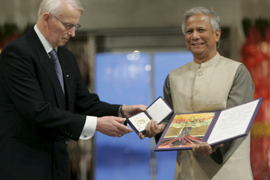Bangladesh force a ‘death squad’
Rights group accuses elite government force of killing hundreds held in custody.

As well as accusing them of being responsible for the deaths of people held in custody, a report released by Human Rights Watch said the Bangladeshi Rapid Action Battalions were responsible for widespread torture that included beatings, boring holes in suspects with electric drills and giving them electric shocks.
Brad Adams, the US group’s Asia director, said the battalions “had become a government death squad”.
Shameful behaviour
| “Bangladesh’s Rapid Action Battalion has become a government death squad” Brad Adams, Human Rights Watch |
It is the second time in as many days that the elite force has been criticised after the New Delhi-based Asian Centre for Human Rights described Bangladesh as the worst abuser of rights in South Asia.
Adams said the battalions behaviour was “especially shameful to a nation whose citizen just won the Nobel prize for peace”.
Muhammad Yunus won the 2006 peace prize with the Grameen Bank he founded to lend money to the poor of Bangladesh.
Officials at the Bangladesh embassy were not immediately available for comment.
Human Rights Watch said Bangladesh government officials have said the government has given the force a mandate to kill suspected criminals instead of making arrests, and had even drafted a list of most-wanted criminals to kill.
Continued violence
A caretaker government is in charge in Bangladesh after Begum Khaleda Zia stepped down as prime minister in October in accordance with the country’s constitution, which requires power be given to an independent, interim authority that then has to organise elections within three months.
Human Rights Watch said killings by the battalions had continued since the Bangladesh Nationalist party, which has defended the deaths as the result of criminals resisting arrest or being caught in a crossfire, handed over power.
Meanwhile, after meeting late on Wednesday to discuss next month’s polls, government advisers decided to seek talks with the alliance to discuss its demands.
Supporters of the alliance said they would hold demonstrations outside election offices to demand changes in the Election Commission, including the removal of two commissioners it says favour Zia.
Different dates
Shafiqul Huq Chowdhury, a government adviser said: “The alliance has said they will come to the polls if proposed changes are made.”
He said the government was hopeful it could resolve the outstanding issues “in two or three days”.
 |
| Bangladeshi Muhammad Yunus won this year’s Nobel peace prize |
The alliance, led by Sheikh Hasina, a former prime minister, also wants the election date, currently January 23, to be postponed further.
Advisers were expected to hold talks with the alliance’s main rivals, a four-party coalition led by Zia which wants the commissioners and the poll date unchanged.
The Election Commission has said the poll date, which has already been postponed by two days, cannot be delayed further because the elections must be held within 90 days after a prime minister leaves office.